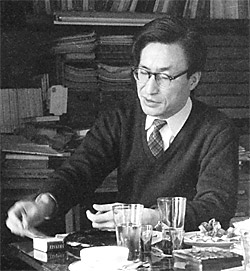<Back to Index>
- Political Scientist Masao Maruyama, 1914
- Architect Nicolas Henri Jardin, 1720
- German Emperor Wilhelm I, 1797
PAGE SPONSOR

Maruyama Masao (March 22, 1914 - August 15, 1996), was a leading Japanese political scientist and political theorist. His expertise lay in the history of Japanese political thought, to which he made major contributions.
Maruyama Masao was born in Osaka, the second son of journalist Maruyama Kanji. He was influenced by friends of his father such as Hasegawa Nyozekan, a circle of people identified with the liberal current of political thought during the period of Taishō democracy. After graduating from Tokyo Furitsu Number One Middle School (currently known as Tokyo Municipal Hibiya High School), Number One High School (after World War II, it was integrated into University of Tokyo), he entered the Tokyo Imperial University and graduated from the Department of Law in 1937. His doctoral thesis 'The Concept of the Nation-state in Political Science' earned a Distinguished Thesis Award, and Maruyama was appointed assistant in the same department.
Originally he had wanted to specialize in European political thought, but changed his focus to concentrate on Japanese political thought, a subject that until that time, mainly centered around the concept of an imperial state, and was influenced by a foundational ordinance that required subjects to be taught 'in accordance with the needs of the state'. Maruyama brought to the discipline a theoretical perspective grounded in extensive comparativism. The person who originally recommended this path to him was his mentor, Professor Nanbara Shigeru, who was highly critical of military and bureaucratic obstructions to the growth of a constitutionally defined 'national community'. A expert in European political thought, Nambara steered the young Maruyama into working on this topic.
In March 1945, Maruyama was drafted and stationed in the Army at Hiroshima. After experiencing the blast at Hiroshima and seeing out the end of the war there, he returned to his post at the university in September. Immediately following the war he published "The Logic and Psychology of Ultranationalism" and other theses dealing with prewar militarism and fascism which left a strong impact on postwar Japan. He was famous for calling the prewar imperial system a "system of irresponsibility". He was also a powerful democratic opinion leader, going far beyond the academic world and wielding great influence regarding the Treaty of San Francisco and the student movements of 1960.
However, in the late 1960s he was strongly denounced by the student's front as a symbol of self-deceiving postwar democracy. He criticized this student movement, especially when his research room at University of Tokyo was ransacked by occupying students in 1969, an episode he characterised as an act of 'barbarism not even Nazis did'. This, combined with his own ailing health forced him to retire in 1971. He was, however, appointed professor emeritus at the same university in 1974.
Though
Maruyama suffered from poor health especially in his later life, he
continued studying and writing until he died in 1996. The major work of
his retirement years was a 3 volume commentary on Fukuzawa Yukichi's principal work Bunmeiron no Gairyaku, based on a lengthy seminar he conducted with a small working group. This was published in 1986, as Reading 'An Outline of a Theory of Civilisation',
by Iwanami Shoten. Besides, he contributed several more noteworthy as
well as controversial works on Japanese Culture or the process of
translation in modern Japan.
Maruyama was awarded the Order of the Sacred Treasure, Third Class by the Japanese government in 1976.